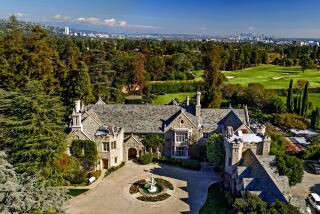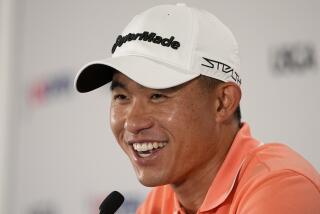Baggs Making Impression in Britain : Golf: She left the United States to hone her skills on the Women’s Professional Golf European Tour, but ended up finding a home as a club professional.
TWICKENHAM, England — As golf courses go, Twickenham Park isn’t much.
Flat, brown, dry because of drought and overgrown from lack of care, it is a privately owned nine-hole public course in the Richmond suburb of Greater London. It’s the kind of a course where people walk their dogs in the evening and a rule on the score card reads: “Stones may be removed (from bunkers) without penalty.”
What sets Twickenham Park apart from other British courses is its director of golf. Suzy Baggs, 27, of Pasadena, Calif., a graduate of San Diego State, class of 1984, one of only five female club professionals in the British Isles and the only American.
“It was a bit of a shock to some of the old-timers when a slip of a lass from across the ocean took over at Twickenham,” said Arnold McCafferty, one of the old-timers. “There was some grumbling, but most of it stopped when we saw her hit a ball. No one around here ever hit a ball like that, much less a girl.”
Baggs went to England four years ago to hone her game on the Women’s Professional Golf European Tour with an eye toward returning home and taking a shot at the LPGA tour. She settled in Twickenham, where she lives in a 200-year-old manor with Denis O’Regan, a rock musician photographer, to be near London’s Heathrow airport.
“It was just a fluke, my getting this job,” Baggs said while taking a visitor from California on a tour of the facility. “I had never played the course, but it’s only five miles from where I live and I used its driving range to practice. One day I noticed a sign advertising for a head pro. I decided to apply.
“I told them about my playing ability, but that didn’t interest them so much until I mentioned I had a master’s degree in business administration. That did it. They were a lot more interested in my MBA than they were in my game.”
After graduating from San Diego State, where she was captain of the women’s golf team, Baggs stayed two more years to earn her master’s.
“I’m sure it pleased my folks that I’m finally getting some use out of that degree,” she said, laughing.
Suzy’s parents, Ralph and Sally Baggs, are members of the Annandale Golf Club in Pasadena, where Suzy learned her golf from professionals Pat Rielly, Jim Petralia and Mike Kelley, now head pro at San Gabriel.
The Twickenham Park course was a municipally run facility until last year, when it was acquired by Sudor Sports, which operates 10 courses in Great Britain somewhat like American Golf does in the United States. When Baggs took over as the pro last September, the course was run down from lack of care and had little play.
“Real golfers didn’t know we were here,” she said. “The place was such a disaster that no one wanted to play. The rough was knee-high in weeds and the whole place was very neglected. Municipal courses over here are considered public land, so people would wander through it, picnicking and walking their dogs. It wasn’t a great atmosphere for golf.”
The dogs also contribute to the unusual looks of the course. The plastic flag sticks, instead of standing straight up from the cups, are as crooked as question marks. Why? Because big dogs yank them out and shake until they are twisted out of shape.
“I don’t know if we’ll ever be rid of the dogs, but they’re not our worst problem,” Baggs said. “That is the drought, but we’re no different from any other course over here. No one has sprinkler systems because they were never needed before. But now we’re in such a drought that everything is brown and burned out. The only place we water are the greens.”
Fulwell, a private club adjacent to Twickenham Park which Baggs calls “the Annandale of Richmond,” is so dry that it has a notice posted, asking players to “Please tee up your ball in the fairway to save what is left of the grass.”
Before World War II, Fulwell was an 18-hole private course with nine holes for women in the middle. Henry Cotton, Britain’s greatest golfer--at least before Nick Faldo--got his first pro job at Fulwell in the 1930s.
“ ‘Suzy Baggs and Henry Cotton, two pros who got their start in Twickenham,’ how does that sound?” Baggs asked, relishing the thought.
During the war, a portion of Fulwell was requisitioned to build warehouses and the rest was planted in wheat and barley. After hostilities ceased, the warehouses remained and a new 18-hole course was created for Fulwell. Some of the original holes remained, so the borough of Richmond decided to use them for a municipal course they named Twickenham Park.
“You can tell that it was a fine course once when you look closely at some of the holes,” Baggs said. “Our fourth hole is a dogleg par-four that is 474 yards. You don’t find that in public courses. It was one left over from the old Fulwell course. We still have some great old trees that give Twickenham Park some character. If we could only get the fairways green again.”
The course measures 3,050 yards and plays to par 36. Its most impressive features are giant beech, magnolia and chestnut trees and deep bunkers so characteristic of British links.
A nine-hole round costs three pounds, or about $5.50.
Baggs, who has a staff of 15 employees, also has plans for a night-lighted driving range that she anticipates will bring in more money than the course. At the time, the range area is often rented out for use as a cricket square or a rugby and soccer field for local teams. Twickenham is the international home of rugby.
“There is talk of taking the range area and the current nine holes and making a short 18-hole course, but I think a night driving range would be a better financial move and please more customers,” she said. “With two sets of tees, we have an interesting 18 holes the way it is now.”
Her biggest impact has been with a junior golf program.
“Unless a youngster’s family belongs to a private club, which is very expensive, he doesn’t have a chance to learn the game around here,” she said. “I started clinics for different age groups and now have some fine players who are active in junior tournaments.
“Courses like Twickenham are sort of like a nursery or incubator for juniors. When kids get good enough, they get recruited by private clubs, which is good for them. In the meantime, I’m enjoying working with beginners and getting them started out right.”
Brian Hamshere, a Twickenham player whose 11-year-old son, Andrew, is in Baggs’ junior program, said, “Suzy has been good for golf here because the youngsters take quite well to her and she relates to them. She has been a breath of fresh air at the course.”
Baggs, who still plays as many European tour events as she can fit into her schedule, is ambivalent about her golfing future.
“I can make a lot more money as a club pro and I don’t have to live out of a suitcase,” she said. “But on the other hand, there’s no feeling in the world like shooting a great round in a tournament. My friend, Cathy Panton from Scotland, has been playing tour golf for 10 years. I don’t know if I could do that. I don’t know which way I’ll go, in the end, but right now I’m having a kick out of getting Twickenham Park back into shape.”
Panton’s father, John, is a former British Ryder Cup player who beat Sam Snead, 3 and 2, for the World Seniors championship in 1967.
“It takes a lot of courage for Suzy to take a job like that, in a field full of men,” Panton said. “Last week she played in a tournament for club pros and she was the only woman among 129 men. And she had to play from the men’s tees like all the guys. That’s the sort of thing she’s going to be facing, and that takes courage.”
Still, Baggs is holding her own on the course. In the Luxembourg pro-am a week ago, she had two eagles and three birdies and shot 71, finishing fourth.
Only two things about being an American in a British environment bother Baggs.
One is not knowing quite what to say when she is asked about the U.S. being the host of soccer’s World Cup in four years.
“When they find out I’m an American, more people want to talk to me about the World Cup than about golf,” she said. “They all want to know why the United States even wants it, if the people don’t care about it. They can’t believe that there’s no interest in it over there. Everyone keeps wanting to know if the U.S. will give it up to some country where it’s wanted.
“When the World Cup was on last month, everything stopped in England. I mean, no one played golf, no one rode the trains, no one was on the freeways, no one went to work. The country absolutely stopped everything to watch the games.”
The other thing is, she will have to miss her 10th high school reunion at the Westridge School for Girls in Pasadena on Sept. 29.
“I want to go, real bad, because I’m curious to see what all the Westridge girls look like after 10 years. But there’s so much to do around here, and I have a tournament the following week.”


